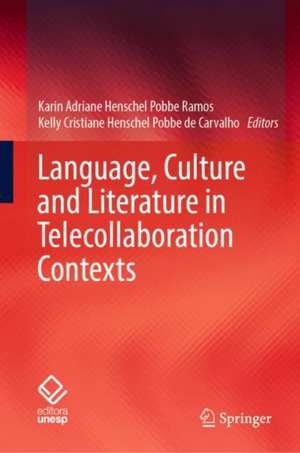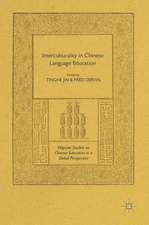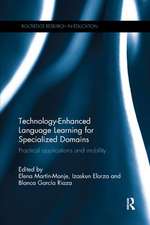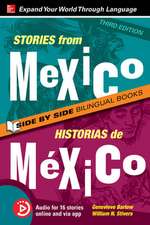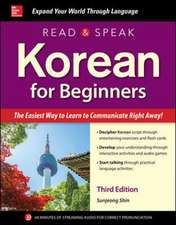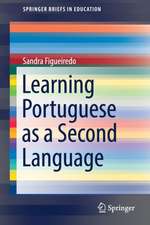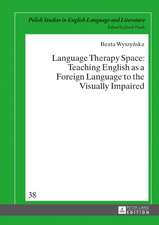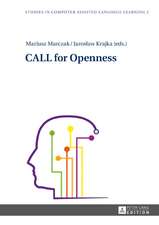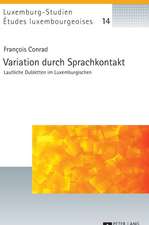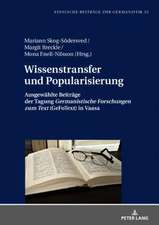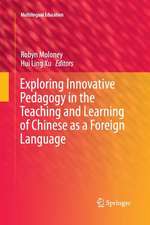Language, Culture and Literature in Telecollaboration Contexts
Editat de Karin Adriane Henschel Pobbe Ramos, Kelly Cristiane Henschel Pobbe de Carvalhoen Limba Engleză Hardback – 2 sep 2023
The BRaVE Program aims at fostering an online collaborative learning modality that promotes intercultural contact and the exchange of ideas by connecting Brazilian undergraduate or graduate students with students from different higher education institutions around the world. The Teletandem Brasil Project is based on a mode of telecollaboration (teletandem)that creates a virtual, collaborative and autonomous context for learning foreign languages in which two students help each other to learn their own languages or a language of proficiency. They do so by using the text, voice and webcam image resources, and by adopting the three principles of tandem learning: autonomy, reciprocity, and separate use of both languages.
Language, Culture and Literature in Telecollaboration Contexts will be of interest to both educational researchers and teachers as it presents, on the one hand, an innovative tool to promote the democratization of foreign language learning; and, on the other hand, discusses how telecollaborative projects can contribute to the training of language and literature teachers.
Preț: 767.66 lei
Preț vechi: 936.17 lei
-18% Nou
Puncte Express: 1151
Preț estimativ în valută:
146.98€ • 153.05$ • 121.95£
146.98€ • 153.05$ • 121.95£
Carte tipărită la comandă
Livrare economică 14-28 februarie
Preluare comenzi: 021 569.72.76
Specificații
ISBN-13: 9783031338298
ISBN-10: 3031338294
Pagini: 144
Ilustrații: XVII, 144 p. 1 illus.
Dimensiuni: 155 x 235 mm
Greutate: 0.41 kg
Ediția:1st ed. 2023
Editura: Springer International Publishing
Colecția Springer
Locul publicării:Cham, Switzerland
ISBN-10: 3031338294
Pagini: 144
Ilustrații: XVII, 144 p. 1 illus.
Dimensiuni: 155 x 235 mm
Greutate: 0.41 kg
Ediția:1st ed. 2023
Editura: Springer International Publishing
Colecția Springer
Locul publicării:Cham, Switzerland
Cuprins
Chapter 1: Task Design within Virtual Exchange: the Case of Institutionally Integrated Teletandem.- Chapter 2: Inclusive Learning: Perspectives on Virtual Exchange and Global Learning.- Chapter 3: Democratizing knowledge of foreign languages and cultures in a telecollaborative context: considerations grounded on Critical Pedagogy.- Chapter 4: Towards an intercultural and decolonial pedagogy in telecollaborative practices.- Chapter 5: Portuguese language teaching, lusophone literature and telecollaboration.- Chapter 6: Literary genres and teaching Portuguese as a foreign language in Teletandem.- Chapter 7: Spanish teaching-learning process in the teletandem context: dialogues about literature.- Chapter 8: The Mexican Corrido and the Brazilian Cordel: traditional poetic textures in transit through the telecollaborative network.- Chapter 9: Brazilian perspectives on Italian cinema: outlook for interfaces between literature, history and audiovisual in the context of telecollaboration.
Notă biografică
Karin Adriane Henschel Pobbe Ramos is an Associate Professor at the Department of Linguistic, Literary and Education Studies at School of Sciences, Humanities and Languages, of the São Paulo State University (UNESP) in Assis, Brazil, and works at the Graduate Program in Languages at the same institution. She has been part of the Teletandem Brasil Project from its inception and involved with pairing students, contacting foreign professors at affiliated universities, and coordinating mediation sessions. She develops research in the areas of Education and Applied Linguistics, acting mainly in the training of Portuguese teachers. She is supervisor of the Center for Languages and Teacher Development at UNESP Assis and in the scope of the CAPES / PRINT Program she coordinates the International Research Network, with the proposal of studies on Difusion of Language, Culture and Literature in a Telecollaboration Contexts.
Kelly Cristiane HenschelPobbe de Carvalho is an Associate Professor of Spanish as a Foreign Language at the Department of Modern Languages at School of Sciences, Humanities and Languages, of the São Paulo State University (UNESP) in Assis, Brazil, and works at the Graduate Program in Languages at the same institution, supervising research at Master’s and PhD levels. She holds a PhD in Languages Studies from UNESP Assis. Kelly has been part of the Teletandem Brasil Project from its inception and involved with pairing students, contacting foreign professors at affiliated universities, and coordinating mediation sessions. She has also been a linguistic supervisor at the Center for Language and Teacher Development at UNESP Assis. Her research interests focus on language teaching and learning processes, telecollaboration and virtual exchange contexts, literacy studies and teacher education.
Kelly Cristiane HenschelPobbe de Carvalho is an Associate Professor of Spanish as a Foreign Language at the Department of Modern Languages at School of Sciences, Humanities and Languages, of the São Paulo State University (UNESP) in Assis, Brazil, and works at the Graduate Program in Languages at the same institution, supervising research at Master’s and PhD levels. She holds a PhD in Languages Studies from UNESP Assis. Kelly has been part of the Teletandem Brasil Project from its inception and involved with pairing students, contacting foreign professors at affiliated universities, and coordinating mediation sessions. She has also been a linguistic supervisor at the Center for Language and Teacher Development at UNESP Assis. Her research interests focus on language teaching and learning processes, telecollaboration and virtual exchange contexts, literacy studies and teacher education.
Textul de pe ultima copertă
This book describes and analyses experiences of teaching and learning language, culture and literature based on telecollaboration, an approach that creates interactions between groups of learners from different countries through the integration of a series of virtual and intercultural collaborative tasks to the curricula of undergraduate and graduate courses. The experiences analyzed in this volume come from two telecollaborative projects developed by the São Paulo State University (UNESP), in Brazil, with universities from other countries: the Brazilian Virtual Exchange (BRaVE) Program and the Teletandem Brasil Project.
The BRaVE Program aims at fostering an online collaborative learning modality that promotes intercultural contact and the exchange of ideas by connecting Brazilian undergraduate or graduate students with students from different higher education institutions around the world. The Teletandem Brasil Project is based on a mode of telecollaboration (teletandem) that creates a virtual, collaborative and autonomous context for learning foreign languages in which two students help each other to learn their own languages or a language of proficiency. They do so by using the text, voice and webcam image resources, and by adopting the three principles of tandem learning: autonomy, reciprocity, and separate use of both languages.
Language, Culture and Literature in Telecollaboration Contexts will be of interest to both educational researchers and teachers as it presents, on the one hand, an innovative tool to promote the democratization of foreign language learning; and, on the other hand, discusses how telecollaborative projects can contribute to the training of language and literature teachers.
The BRaVE Program aims at fostering an online collaborative learning modality that promotes intercultural contact and the exchange of ideas by connecting Brazilian undergraduate or graduate students with students from different higher education institutions around the world. The Teletandem Brasil Project is based on a mode of telecollaboration (teletandem) that creates a virtual, collaborative and autonomous context for learning foreign languages in which two students help each other to learn their own languages or a language of proficiency. They do so by using the text, voice and webcam image resources, and by adopting the three principles of tandem learning: autonomy, reciprocity, and separate use of both languages.
Language, Culture and Literature in Telecollaboration Contexts will be of interest to both educational researchers and teachers as it presents, on the one hand, an innovative tool to promote the democratization of foreign language learning; and, on the other hand, discusses how telecollaborative projects can contribute to the training of language and literature teachers.
Caracteristici
Presents results of telecollaboration projects aimed at democratizing foreign language education Proposes an innovative and accessible methodology to promote intercultural education Integrates language, culture and literature teaching and learning in one single approach
